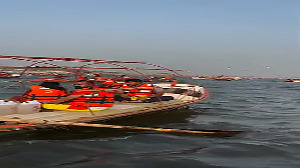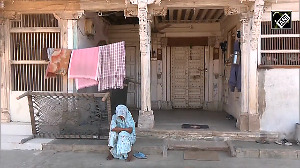
It is an overcast Monday morning. Titwala, a nondescript town 75km from Mumbai, is swathed in various hues of green. The monsoon has been good and it is showing.
The town's narrow streets had little boys walking barefoot and girls in their white shirts and navy blue pinafores rushing to school. Horse-driven carts laden with plastic water drums rumble past.
About a kilometre away from this town is the Kalu river. Set across the river are the predominantly tribal hamlets of Konderi and Vasundi. These hamlets can be reached by a five-minute boat ride. There is a bridge too, but it is incomplete. It's been under construction for nearly five years now.
Most villagers till land and do odd jobs in the town to supplement their meagre earnings from farming.
The boat ride to the town costs Rs 2 for a return ticket, but even that is beyond the means of most villagers, especially students. So, they take the unfinished bridge, risking their life and limb every day.
The schools in the village have classes only up to Grade 7. For senior school the students have to attend either Janki Vidyalaya or Ganesh Vidyamandir in Titwala.
Work on the bridge is, for the most part, over. A worker on the site says only 15 per cent work now remains. This 15 per cent is the landing at the town end, which when complete will take away a part of the farm land owned by a certain Arjun Patil. He has moved court and obtained a stay order.
The villagers on their way back from the town climb up the unfinished part of the bridge using its jutting cement slabs, protuding girders, and rusted iron rods, and then walk across to their villages.
At the unfinished end of the bridge is a wooden plank propped up by a bamboo with a warning written on it in a rough Marathi hand -- the bridge is under construction and it is dangerous to use it. But even children as young as 12 can be seen heaving themselves up the last few feet of the climb using the very bamboo that holds up this board.
Watching from a distance, it all looks like a little fun -- children clambering up the bridge. They don't mind the hard work and look oblivious to the risk involved. Some say they use the money saved by not taking the boat to buy vada-pav in the town. They hold each other's satchels, extend helping hands to friends, and bend iron rods to make them of greater assistance in the climb.
But there have been mishaps. The most recent, just a week back.
Raghunath Vaghe used to do odd jobs in the town to add to his modest earnings from fishing. He was the only earning member in a family of five, supporting a young wife, a two-year-old daughter, and an aged mother.
On that fateful day, he was on his way back from the town. While climbing the unfinished part of the bridge an iron rod gave away and Vaghe plunged 10 metres down landing on his back.
The family has since exhausted all its savings on doctors' fees but Vaghe is still not able to even sit up.
On the river bank, I met a group of children returning home from school. The moment they learnt I was a reporter, they broke into a sprint towards the bridge. After a Marathi newspaper recently featured the bridge in its pages, reporters have been visiting Titwala almost every day. As a result, the children by now have a clear idea what they are looking for.
Soon they were trying to outdo each other climbing the concrete monster. Perching on the boulders lying in the muddy river, they pushed one another up to the plinth level and then catching hold of the dangling iron rods they climbed up to the beam. After catching their breath, they placed one foot after another on jutting rods again to climb up to the flat surface of the bridge.
Ramchandra, a ninth standard student of Janki Vidyalaya, said he was the fastest of the group. Other boys, all smaller than him, nodded in agreement.
Parents in the villages and teachers in the schools say they have given up worrying about the children's daily commute. The common refrain is how long can one go on worrying about a problem.
Five years is a long time indeed.






 © 2025
© 2025